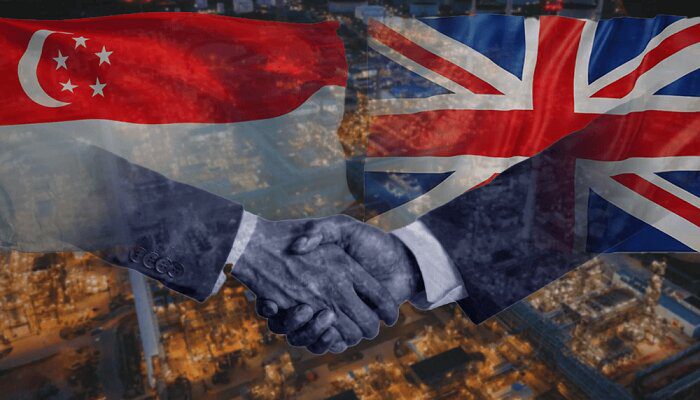The 8th UK-Singapore Financial Dialogue, which convened in London, represented a significant milestone in the ongoing collaboration between the United Kingdom (UK) and Singapore. The Dialogue, a platform for exchanging ideas and exploring opportunities for cooperation, focused on two pivotal areas: sustainable finance and FinTech and innovation. This article delves into the key highlights and outcomes of this crucial dialogue.
Sustainable Finance:
- Transition Finance: The delegates from both the UK and Singapore expressed a shared sense of urgency regarding the imperative need to develop strategies that facilitate and scale financing to expedite the transition of economies towards net-zero emissions. They concurred that the creation of globally comparable and transparent transition plans, enriched with credible forward-looking information, could serve as a linchpin in reducing fragmentation, amplifying transition finance, and fostering sustainability in the financial sector.
Singapore’s Monetary Authority (MAS) provided vital updates on its commitment to scaling blended finance and addressing energy transition needs in the Asian region. The agency outlined its Finance for Net Zero Action Plan (FiNZ Action Plan) and various initiatives aimed at mobilizing green and transition financing to catalyze Asia’s journey towards net-zero emissions.
On the UK front, the Transition Plan Taskforce (TPT) shared insights into its ongoing work to finalize a comprehensive disclosure framework. The TPT also highlighted its international engagement with governments and regulatory bodies, focusing on the framework’s global applicability. This initiative paralleled the efforts of the International Sustainability Standards Board (ISSB) in establishing final standards that would significantly impact the international landscape.
- International Standards: An unambiguous commitment to global sustainability disclosures was reaffirmed by both the UK and Singapore. They lent their unwavering support to a framework based on the ISSB final standards, encompassing both general sustainability reporting and climate-related disclosures. This commitment extended to the implementation of globally interoperable sustainability disclosures.
A pivotal moment in this trajectory was the endorsement of the ISSB’s standards by the International Organization of Securities Commissions (IOSCO). This endorsement carried profound implications, underlining the necessity of a global framework for transition and sustainability disclosure standards. Such a framework promised to usher in a simpler, more consistent, and highly effective regulatory environment, benefiting firms, regulatory bodies, and financial authorities alike.
The commitment of the UK and Singapore did not stop at mere affirmation; they pledged to actively support the ISSB in realizing its goal of achieving globally interoperable disclosure standards. This support encompassed various dimensions, including capacity building and the exchange of experiences. Moreover, the two countries engaged in a constructive dialogue concerning their respective Environmental, Social, and Governance (ESG) data and ratings codes of conduct. This dialogue served as a testament to their commitment to explore deeper bilateral cooperation and promote global coordination, aligning expectations on an international scale.
- Nature and Biodiversity: The preservation of nature and biodiversity emerged as a cornerstone of the dialogue’s sustainability discourse. Both the UK and Singapore concurred on the necessity of deepening their understanding of the ramifications of nature and biodiversity loss on the financial sector. In a significant stride towards this understanding, they welcomed an upcoming joint research project focused on nature-related financial risks in Southeast Asia.
This collaborative endeavor featured the University of Cambridge Institute for Sustainability Leadership (CISL) and the Singapore Green Finance Centre. Notably, the latter institution operates under the joint management of Imperial College Business School and Singapore Management University (SMU). The UK, in its commitment to this cause, showcased its efforts to quantify the financial and economic risks stemming from exposure to natural degradation. These efforts were bolstered by the UK’s Green Finance Institute, supported by key stakeholders such as the Bank of England (BoE) and the Department for Environment, Food & Rural Affairs (DEFRA).
Further emphasizing their commitment, the UK provided updates on the Taskforce on Nature-related Financial Disclosures (TNFD), which was poised to release its framework in September 2023.
FinTech and Innovation:
- Crypto and Digital Assets: The dynamic world of crypto and digital assets commanded significant attention in the dialogue. The UK and Singapore pledged to actively contribute to the development of global regulatory standards for these assets. Their commitment extended to participation in international standard-setting bodies such as IOSCO and various working groups under the Financial Stability Board (FSB). A notable milestone was the warm reception given to FSB recommendations on crypto-assets, including stablecoins.
The UK, in particular, provided a comprehensive update on its approach and the invaluable industry feedback garnered during the consultation on the Future Financial Services Regulatory Regime for Crypto-assets. Furthermore, the UK shared insights into the regulatory rules governing the marketing of crypto-assets. Singapore, on its part, shed light on its perspectives regarding regulatory developments related to stablecoins and measures aimed at ensuring consumer protection in the realm of Digital Payment Token Services.
- Central Bank Digital Currency (CBDC): Central Bank Digital Currencies (CBDCs) represented a topic of mutual interest and exploration. The UK outlined its “Digital Pound” consultation and the strategic plans for the ongoing design phase. Singapore, on the other hand, provided insights into its approach to exploring use cases for a digital Singapore Dollar. Additionally, the country showcased its efforts in fostering interoperability, a crucial element in the evolving landscape of CBDCs. Singapore’s proactive approach extended to the exploration of wholesale CBDCs for cross-border foreign exchange settlement.
- Project Guardian: Singapore shared the latest developments surrounding Project Guardian, a collaborative initiative that brought together the private and public sectors. This initiative was dedicated to testing the potential and feasibility of asset tokenization, a concept that held significant promise in the world of finance. Both the UK and Singapore expressed their willingness to consider future collaboration opportunities in this exciting and transformative domain.
- E-Wallets: E-wallets emerged as a focal point of discussion. The UK welcomed the outcomes of MAS’ review of e-wallet caps, particularly the adjustments made to relevant limits imposed on e-wallets. This development promised to enhance the accessibility and utility of e-wallets, aligning them more closely with the evolving needs of the financial ecosystem.
Cross-border Arrangement for Trading Venues:
The dialogue witnessed a pivotal update on cross-border arrangements between the UK and Singapore pertaining to the exchange of information regarding derivatives trading venues. This exchange of information encompassed crucial aspects, including derivatives trading obligations and the classification of regulated markets for Exchange Traded Derivatives trading. The consensus on the value of continued cooperation underscored the importance of supporting the G20 OTC derivatives reforms.
The closing of the Dialogue marked the renewal of the commitment of both the UK and Singapore to sustained engagement beyond this critical juncture. A roadmap for future engagements was outlined, with a particular focus on Sustainable Finance and FinTech and Innovation. The next Financial Dialogue was scheduled to take place in Singapore in 2024, promising to build upon the substantial progress achieved during this exchange of ideas and perspectives.
In a parallel development, an industry-led UK-Singapore business roundtable on sustainable finance convened on July 25, 2023. Industry participants engaged in constructive discussions surrounding financing opportunities and challenges encountered in the pursuit of net-zero targets. The financial industry’s role in addressing these challenges emerged as a focal point of the dialogue.
The 8th UK-Singapore Financial Dialogue was jointly chaired by Mr. Leong Sing Chiong, Deputy Managing Director (Markets and Development) of MAS, and Ms. Gwyneth Nurse, Director General (Financial Services) of HM Treasury (HMT). The distinguished attendees included senior officials from MAS, HMT, the Bank of England (BoE), the Financial Conduct Authority, the High Commission of the Republic of Singapore in London, and the British High Commission in Singapore.






















